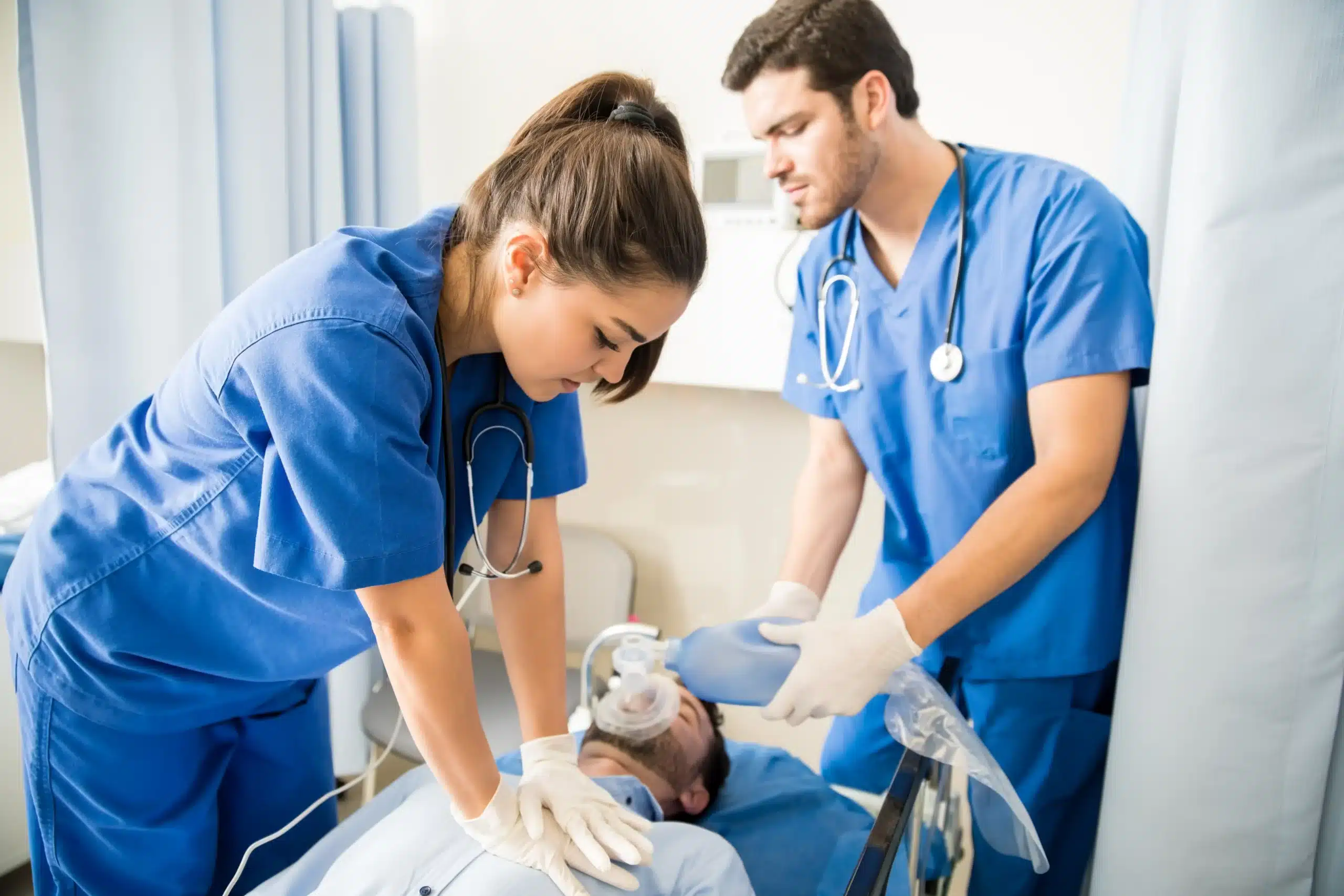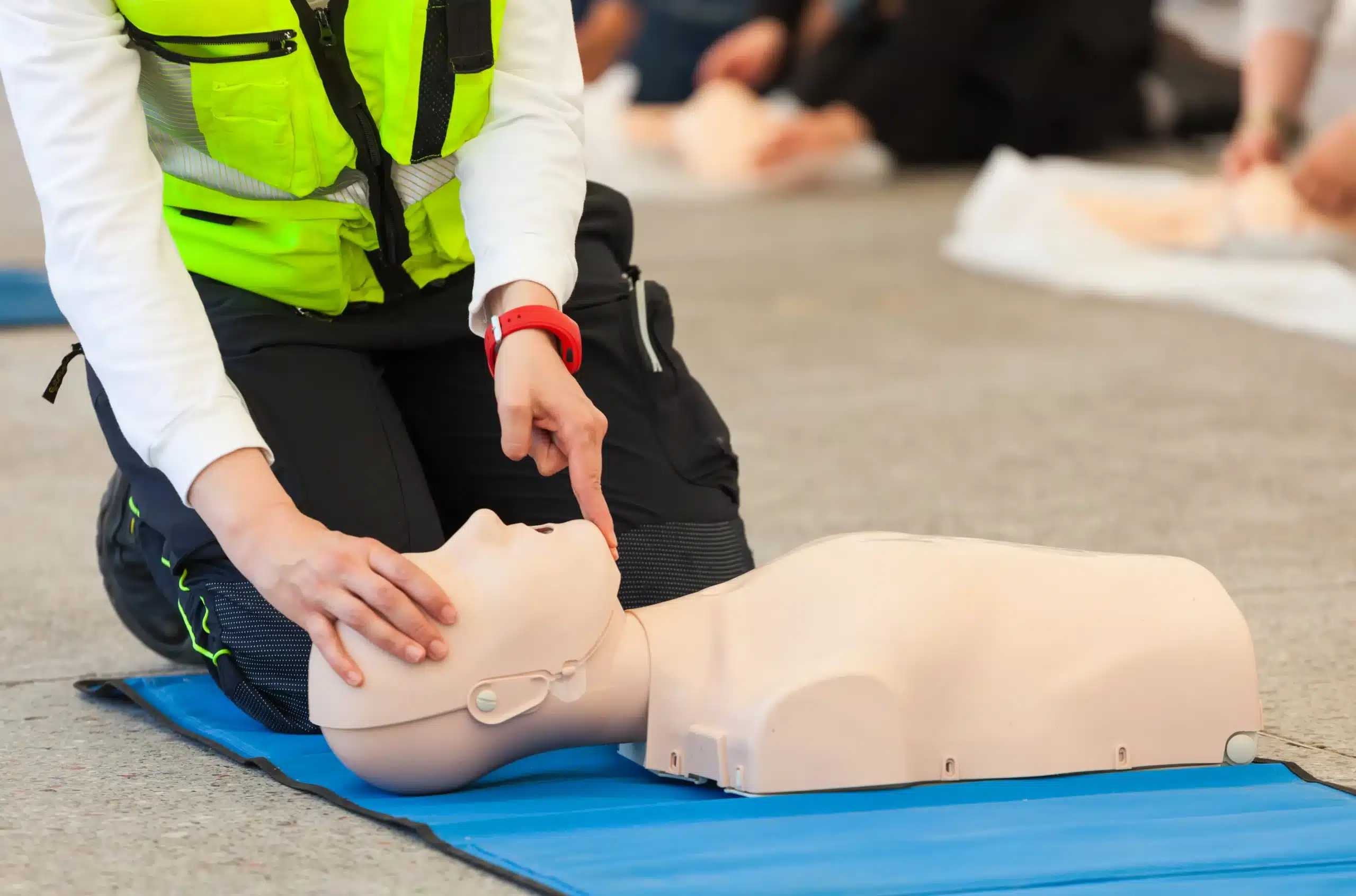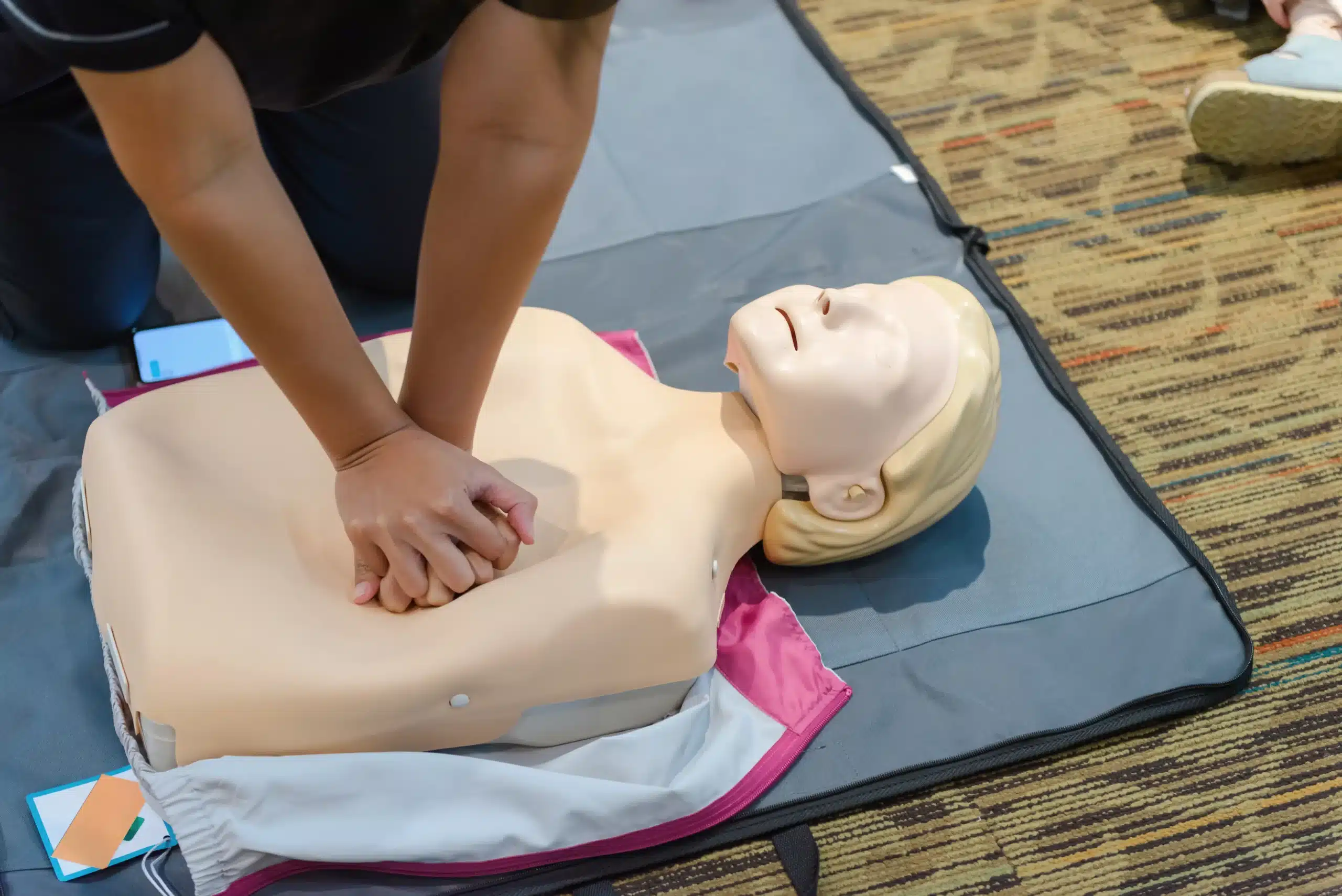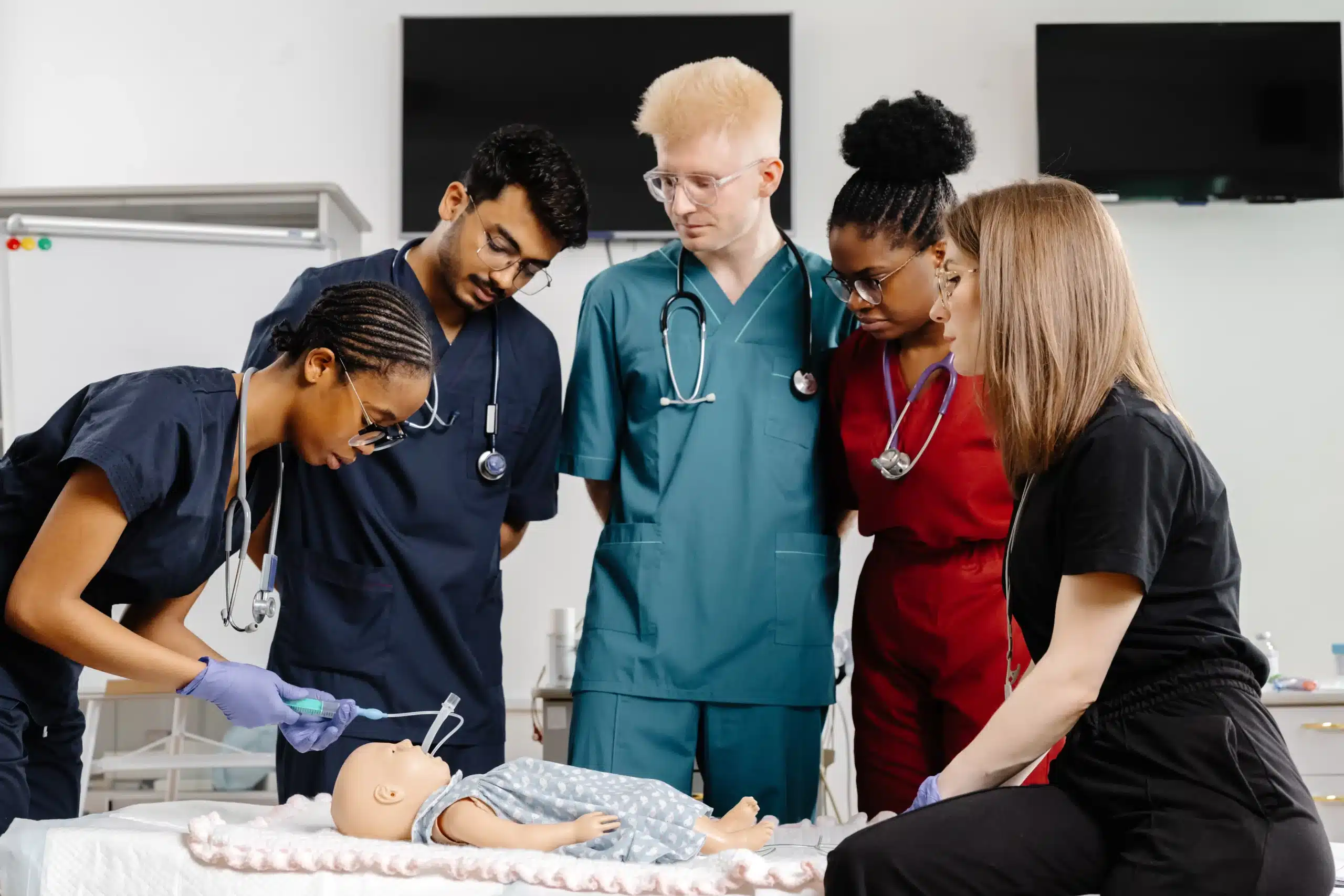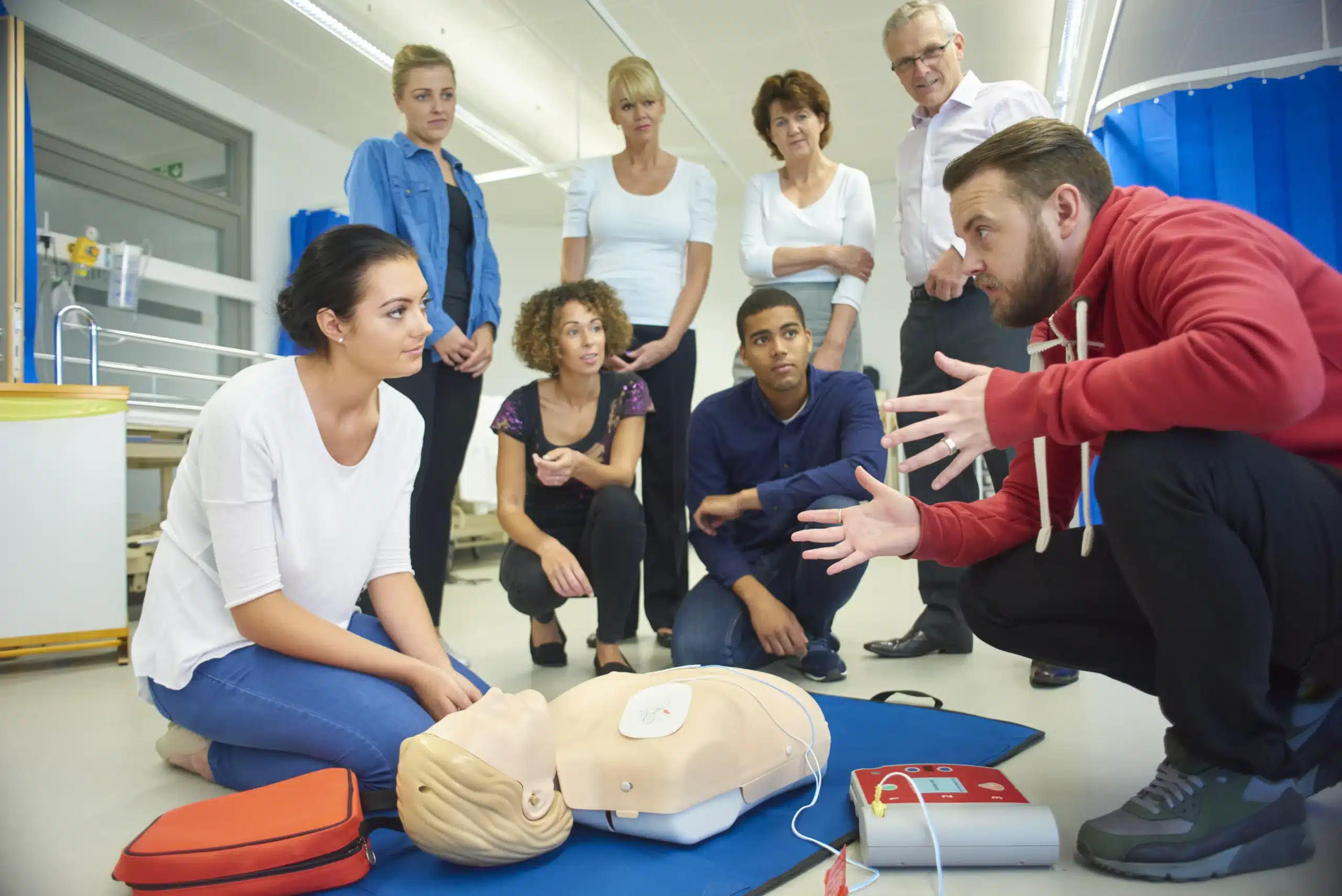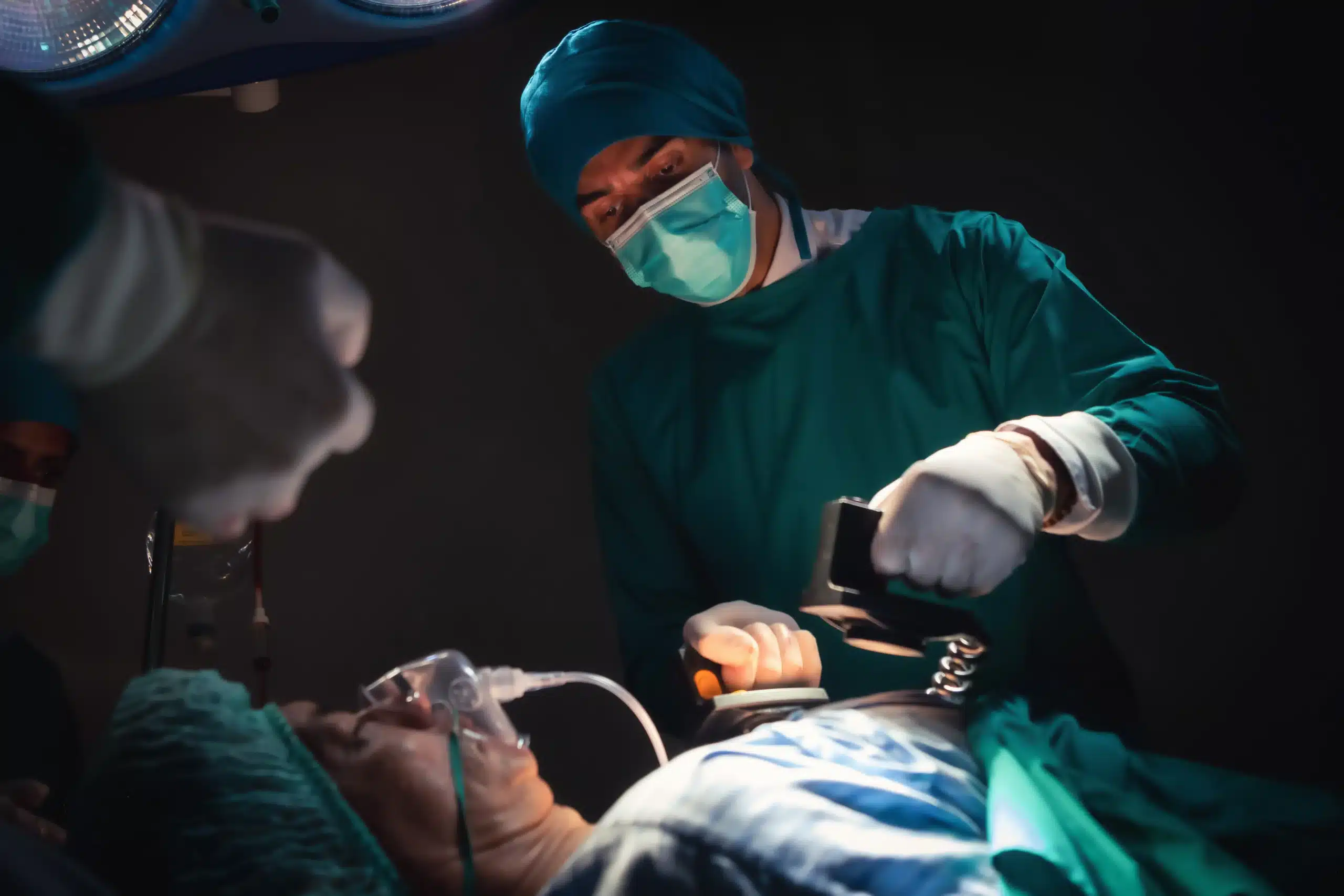CPR—those three letters hold the power to transform you into a potential lifesaver. But where do you begin your journey to becoming CPR certified? This comprehensive guide simplifies the process, providing valuable insights into CPR training and certification in the San Francisco Bay Area. We’ll explore the importance of CPR, break down different CPR courses in the SF Bay Area, and highlight reputable training providers in San Francisco. Whether you’re a medical student, a teacher, a parent, or simply someone who wants to be prepared for emergencies, this guide will help you find the right CPR course for your needs.
Key Takeaways
- CPR training empowers you to make a difference: Whether you’re a healthcare professional or a concerned citizen, learning CPR equips you with the skills to respond effectively in emergencies. Explore various course options, from basic CPR to advanced certifications, to find the best fit for your needs.
- Finding the right CPR course is easier than you think: Consider your learning style and schedule when choosing between in-person, online, or hybrid formats. Compare providers, look for AHA-certified courses, and check for discounts to make training affordable.
- CPR certification is a valuable investment, not just a requirement: Maintaining your skills through regular renewals ensures you’re always prepared to assist in life-threatening situations. CPR certification provides peace of mind and empowers you to act confidently when every second counts.
What is CPR and Why is it Important?
Learning CPR can empower you to save a life. But what exactly does it involve, and why is it so crucial? Let’s break it down.
What is CPR?
CPR stands for cardiopulmonary resuscitation. It’s a lifesaving technique used when someone’s heartbeat or breathing has stopped. This can happen due to a heart attack, near drowning, or other medical emergencies. CPR involves chest compressions and rescue breaths. These actions maintain blood flow and oxygen to vital organs until professional medical help arrives. CPR keeps the body functioning, buying precious time. For more detailed information, check out our guide on American Heart Association courses.
Why are CPR Skills Crucial?
CPR skills are truly essential. They can be the difference between life and death. Immediate CPR can double or even triple a victim’s chance of survival after cardiac arrest. Think about it: while you wait for paramedics, your CPR skills can keep someone alive. Learning CPR isn’t just about gaining knowledge; it’s about becoming a vital link in the chain of survival. Equipping yourself with these skills allows you to respond effectively during emergencies. CPR training creates a culture of preparedness and empowers individuals and communities to save lives. If you’re in the San Francisco area and looking for CPR training, our CPR training guide offers helpful resources. We also encourage you to explore resources like MyCPR NOW, which offers insights into building inclusive community CPR programs.
CPR Courses in the San Francisco Bay Area
Finding the right CPR class can feel overwhelming with so many options. This section breaks down the different types of CPR courses available in the San Francisco Bay Area, making it easier to choose the best fit for you. Whether you’re a healthcare professional, a concerned parent, or simply want to be prepared for emergencies, there’s a course out there.
BLS
Basic Life Support (BLS) certification is a healthcare provider-level course covering the skills needed to respond to life-threatening emergencies. The course covers single-rescuer and team-based CPR for adults, children, and infants, along with AED use and relieving choking. BLS certification is essential for healthcare professionals, including doctors, nurses, paramedics, and other medical personnel. Safety Training Seminars offers daily AHA courses in CPR and BLS at competitive prices.
ACLS
Advanced Cardiovascular Life Support (ACLS) certification builds on the foundational skills learned in BLS. It focuses on the advanced treatment of cardiac arrest, stroke, and other cardiovascular emergencies. This course is designed for healthcare professionals who are part of adult emergency response teams, such as physicians, nurses, and paramedics. Safety Training Seminars provides various CPR and first-aid certification courses throughout San Francisco.
PALS
Pediatric Advanced Life Support (PALS) certification focuses on the specialized skills needed to respond to emergencies involving infants and children. This course covers topics such as pediatric assessment, airway management, and administering medication in emergency situations. PALS certification is crucial for healthcare providers who work with children, including pediatricians, pediatric nurses, and emergency medical technicians. Safety Training Seminars offers competitive pricing on various AHA-certified courses, including PALS.
First Aid & CPR
Combining First Aid and CPR training provides a well-rounded skill set for responding to various emergencies. First aid training covers treating injuries like cuts, burns, and fractures, while CPR training focuses on life-saving techniques for cardiac arrest and respiratory emergencies. This combined training is valuable for anyone who wants to be prepared for unexpected situations, from parents and teachers to workplace safety officers and community volunteers. Many providers offer a range of learning formats, from in-person and online to hybrid learning. You can find a CPR class near you in Northern California using our directory.
Top CPR Training Providers in the SF Bay Area
Finding the right CPR training provider is essential for a positive learning experience. Here’s a rundown of some reputable options in the San Francisco Bay Area:
Safety Training Seminars
Safety Training Seminars offers a comprehensive range of American Heart Association (AHA) certified courses, including CPR, BLS, ACLS, and PALS, right here in San Francisco. With daily classes and a focus on affordability, they make it easy to fit training into your schedule. They also offer the innovative RQI program for a streamlined, efficient certification process. For more information on their low prices and convenient class schedules, check out their website. They also have a helpful directory of CPR resources in Northern California.
American Heart Association
While the American Heart Association (AHA) doesn’t directly conduct training, they set the standards for CPR education. Many organizations, including Safety Training Seminars, offer AHA-certified courses. This ensures you receive high-quality instruction that meets national guidelines. Learn more about AHA BLS courses offered through Safety Training Seminars.
American Red Cross
The American Red Cross is another well-known provider of CPR and first-aid training. They offer a variety of courses and emphasize ongoing skill maintenance through refresher courses and resources. You can find information on local Red Cross CPR classes and certification options.
Revive CPR
Revive CPR provides AHA-certified CPR, BLS, and First Aid classes in San Francisco. They offer both weekday and weekend options, as well as a blended learning format that combines online coursework with a shorter in-person skills session. Visit their website to see their schedule.
CPR Certification
If you’re specifically looking for CPR certification, Safety Training Seminars offers a variety of courses designed to meet your needs. They provide competitive pricing on AHA-certified courses, making them a popular choice in the Bay Area. Contact them to learn more about their CPR and first-aid certification programs.
CPR Course Formats and Duration
Finding the right CPR course often comes down to format and schedule. Luckily, there are several options available, so you can choose the learning style that best suits your needs and availability. Let’s break down the most common CPR course formats:
In-Person Training
In-person CPR training remains a popular choice. It offers hands-on learning and direct interaction with a certified instructor. This format allows for immediate feedback on your technique and provides a structured learning environment. Safety Training Seminars offers in-person American Heart Association (AHA) certified CPR, BLS, ACLS, and PALS classes in San Francisco, with daily classes and a focus on customer satisfaction. You’ll receive your certification card immediately upon completion of the course, valid for two years. Check out their low price guarantee for the best value in the Bay Area.
Online Courses
Online CPR courses offer a flexible alternative to traditional in-person classes. Learning online allows you to study at your own pace, fitting the coursework around your busy schedule. This format is ideal for those who prefer self-directed learning or have limited time for in-person sessions. While online courses offer convenience, keep in mind that they typically require an in-person skills assessment to receive full certification.
Hybrid Learning
Hybrid learning combines the convenience of online learning with the benefits of hands-on instruction. This blended approach allows you to complete the theoretical coursework online at your own pace, followed by a shorter, in-person skills session. This format often appeals to those who want the flexibility of online learning but also value the personalized guidance of an instructor. For busy professionals, this can be a particularly efficient way to maintain certification.
RQI Program
The RQI (Resuscitation Quality Improvement) program offers a streamlined approach to CPR certification, specifically designed for healthcare providers. This program emphasizes consistent, high-quality CPR skills. Like the hybrid format, RQI combines online learning with shorter, more frequent in-person skills sessions. This allows healthcare professionals to maintain their skills and certification in a more efficient and convenient manner. If you’re a healthcare provider in Northern California, take a look at the CPR directory to find a location near you.
CPR Course Costs & Value
Understanding CPR course costs is an important part of choosing the right class. Prices vary based on several factors, including the type of course, format, and available discounts. Let’s break down what you can expect when budgeting for your CPR training in the San Francisco Bay Area.
Course Costs
CPR certification class costs in the Bay Area fluctuate based on the level of training required. Basic CPR and First Aid courses typically have lower price points than advanced certifications like ACLS or PALS. A basic adult CPR class might cost less than a combined CPR/First Aid class or one that includes infant and child CPR. Safety Training Seminars offers a range of American Heart Association (AHA) courses at competitive prices, so compare options to find the best fit for your needs and budget. Explore our Northern California CPR directory for a broader view of course offerings and pricing in the region.
Additional Fees
Beyond the base course cost, be aware of potential additional fees. Some providers charge extra for certification cards, online learning materials, or practice equipment. In-person classes, while often more expensive due to smaller class sizes and instructor fees, sometimes include these extras. Online or hybrid courses might appear cheaper upfront but could have hidden fees. Always double-check what’s included in the advertised price. Safety Training Seminars is transparent with its pricing and offers a low-price guarantee, giving you confidence you’re getting good value.
Discounts
One of the best ways to save on CPR training is to look for discounts. Many providers, including Safety Training Seminars, offer discounts for groups, students, or returning customers. Group discounts can be significant, sometimes up to 30% off, making it cost-effective for workplaces or community organizations. It’s always worth asking about potential discounts, even if they aren’t advertised. Check if your employer, professional organization, or school offers subsidies or reimbursements for CPR training. Contact Safety Training Seminars to discuss options and learn about current discount opportunities.
CPR Certification: Process & Validity
Get Your CPR Certification
Getting your CPR certification is straightforward. Several organizations offer training in the San Francisco Bay Area. The American Red Cross, for example, offers CPR and First Aid classes with certified instructors. If you’re looking for American Heart Association (AHA) certified courses, Safety Training Seminars offers CPR, BLS, ACLS, and PALS classes daily. For same-day certification, consider Revive CPR, which provides AHA-certified CPR, BLS, and First Aid training. When choosing a provider, consider your schedule and what best suits your needs. We recommend checking with your employer or professional organization for any specific certification requirements.
Renewal Requirements
CPR certifications are valid for two years. To maintain your qualifications, renew your certification before it expires. Many providers, including those mentioned above, offer renewal courses. After completing your CPR course, you’ll receive a certification card, valid for two years, which demonstrates your ability to assist in emergencies. Keep track of your expiration date and plan to renew in advance. Staying current with your CPR training allows you to respond confidently and provide potentially life-saving assistance when every second counts.
Choose the Right CPR Course
Finding the right CPR course involves understanding your needs, comparing available options, and considering logistical factors. Let’s break down how to approach this:
Assess Your Needs
Before you start browsing CPR classes, take a moment to think about your specific requirements. Why are you pursuing CPR certification? Are you a healthcare professional needing BLS certification? Or are you a parent looking for basic CPR and First Aid training? Clearly defining your needs helps narrow your search and ensures you choose a course that aligns with your goals. Also, consider your learning style. Do you prefer hands-on, in-person instruction, or the flexibility of online learning? Finally, think about your budget and how much you’re willing to invest in your training.
Compare Courses
Once you have a better understanding of your needs, start comparing courses from different providers. Look at what each course covers. Some might focus only on CPR, while others include First Aid or AED training. Safety Training Seminars offers a variety of American Heart Association courses, from basic CPR to advanced certifications like ACLS and PALS. Reading reviews can also offer insights into other students’ experiences with specific courses and instructors. Don’t forget to compare costs and look for providers, like Safety Training Seminars, with a low-price guarantee. This ensures you’re getting the best value for your investment.
Consider Logistics
Logistics are important when choosing the right CPR course. Convenience is key, so think about location and scheduling. Safety Training Seminars has classes throughout the Bay Area, making it easier to find a location near you. Check for weekend or evening classes if your weekdays are busy. Also, consider the course format. Do you need the focused environment of an in-person class, or would the flexibility of an online or hybrid course be a better fit? If you’re a healthcare provider needing frequent recertification, explore streamlined options like the RQI program from Safety Training Seminars. This program offers a fast and efficient way to maintain your certification. Carefully considering these factors helps you choose a course that works with your lifestyle.
Enroll in a CPR Course
So, you’re ready to learn CPR? Great! This section walks you through enrolling in a CPR course, from prerequisites to registration.
Prerequisites
Good news: there aren’t many prerequisites for CPR certification. Safety Training Seminars offers various CPR and First Aid certification courses in San Francisco, designed for people of all skill levels. Whether you’re a medical professional seeking recertification or a parent wanting to learn essential lifesaving skills, there’s a course for you. They also offer AHA-certified CPR, BLS, ACLS, and PALS courses, along with First Aid and EMSA certifications. Generally, the main requirement is a willingness to learn and participate actively in the training.
Registration Steps
Finding the right CPR class means considering your schedule, budget, and learning style. Explore different providers, compare costs, and look for flexible scheduling options that make training convenient. Safety Training Seminars offers competitive pricing on all its courses, including CPR, BLS, ACLS, PALS, and First Aid. They even have a low-price guarantee. Once you’ve found a course that fits your needs, registration is usually straightforward. Many providers, including Safety Training Seminars, allow you to register online. You can often choose from various dates and times to find a class that works for you. Some providers may also offer registration by phone or in person. After registering, you’ll receive confirmation and any pre-course information. It’s that simple! You’ll be on your way to becoming CPR certified in no time. Contact us if you have any questions.
CPR Course Locations in the SF Bay Area
Finding the right CPR class means considering a few things: location, cost, and the type of certification you need. The San Francisco Bay Area has many options, so let’s look at CPR course availability by city.
San Francisco
San Francisco has tons of CPR training centers. Safety Training Seminars, for example, offers daily American Heart Association courses in CPR, BLS, ACLS, and PALS at competitive prices. This makes learning these essential skills easier for lots of people. Many other providers offer courses throughout the city, giving you plenty of choices for scheduling and teaching styles.
Oakland
CPR certification class costs in Oakland vary depending on the provider and the specific certification. Compare prices and what each course includes before signing up. Resources like CPR Classes Oakland offer helpful information on average costs and what to expect. The value of the training is more than just the price—it’s an investment in your ability to handle emergencies.
San Jose
When looking for CPR classes in San Jose, check out what past students have to say. Testimonials and reviews can give you a good sense of a course’s effectiveness and help you find the right one. San Jose has many training centers, making it easier to find a class that fits your schedule and learning style.
Other Bay Area Locations
You can find CPR training throughout the Bay Area, not just in the bigger cities. Safety Training Seminars, for instance, offers its CPR certification courses in other locations too. When choosing a class, think about your schedule, budget, and how you learn best. Explore different providers, compare costs, and look for flexible scheduling options. Whether you’re in Berkeley, Concord, or Sacramento, you can find a CPR class that works for you.
CPR Course FAQs
Here are some answers to common questions about CPR courses in the San Francisco Bay Area:
What types of CPR courses are available?
CPR and first-aid certification courses come in several formats. Safety Training Seminars offers American Heart Association (AHA) courses, including BLS, ACLS, PALS, CPR, and First Aid. These courses meet various needs, from basic life support to advanced cardiac care. For those looking for the most efficient way to maintain their CPR skills, Safety Training Seminars also offers the convenient RQI program.
How do I find a CPR class that fits my schedule?
Providers understand that people have busy lives. Look for flexible scheduling options like weekend and evening classes, accelerated courses, and online or hybrid learning. Contact Safety Training Seminars directly through their contact page to discuss your scheduling needs and find a class that works for you. They are known for their accommodating approach and can often tailor their schedules to fit student needs.
What should I look for in a CPR training provider?
A reputable provider, like Safety Training Seminars, a woman-owned AHA Training Center, should offer high-quality, AHA-certified courses at competitive prices. They even have a low-price guarantee. Experienced instructors and positive reviews are also good indicators of a quality program. You can often find reviews and testimonials on a provider’s website or social media channels.
Are there different learning formats for CPR courses?
Yes, you can find CPR training in several formats. In-person classes provide hands-on practice, while online courses offer flexibility. Hybrid learning combines online modules with in-person skills sessions. Choose the format that best suits your learning style and schedule. Safety Training Seminars offers various formats to cater to different preferences.
How long is a CPR certification valid, and how do I renew it?
CPR certifications are typically valid for two years. Renewal involves taking a refresher course before your current certification expires. Check with your provider for specific renewal requirements. For a streamlined renewal process, consider the RQI program offered by Safety Training Seminars. It’s designed for busy professionals and offers a fast and efficient way to stay certified.
Related Articles
- Why CPR is Important in Healthcare
- CPR Courses Near Me: Your Complete Guide – San Francisco Bay Area CPR Classes
- BLS Certification Near Me: Your Complete Guide – San Francisco Bay Area CPR Classes
- ACLS Provider Training in SF Bay Area: A Practical Guide – San Francisco Bay Area CPR Classes
- PALS HeartCode San Francisco: A Certification Guide
CPR Course FAQs
Here are some answers to common questions about CPR courses in the San Francisco Bay Area:
What if I’m not sure which CPR course is right for me?
Choosing the right course depends on your specific needs. If you’re a healthcare provider, you’ll likely need BLS, ACLS, or PALS certification. If you’re a parent, teacher, or community member, a basic CPR and First Aid course might be sufficient. Consider your current knowledge, why you want to learn CPR, and how you plan to use your skills. Safety Training Seminars offers a variety of courses, so you can find one that aligns with your goals. Reach out to them directly—they’re happy to help you find the best fit.
How much do CPR courses typically cost?
CPR course costs vary depending on the provider, the type of course, and the format (in-person, online, or hybrid). Basic CPR courses are generally less expensive than advanced certifications like ACLS or PALS. Look for providers that offer transparent pricing and potential discounts. Safety Training Seminars offers competitive rates and a low-price guarantee, so you can feel confident you’re getting a good value.
What does a typical CPR course cover?
A CPR course teaches you the essential skills to respond to cardiac and breathing emergencies. You’ll learn how to perform chest compressions, give rescue breaths, use an AED (automated external defibrillator), and recognize the signs of a heart attack or stroke. Many courses also include First Aid training, covering how to treat common injuries like cuts, burns, and sprains.
How can I fit CPR training into my busy schedule?
Many CPR training providers offer flexible scheduling options to accommodate busy lifestyles. Look for weekend or evening classes, accelerated courses, or online and hybrid learning formats that allow you to complete some coursework at your own pace. Safety Training Seminars offers a variety of scheduling options, so you can find a class that works for you.
What if I need to renew my CPR certification?
CPR certifications are typically valid for two years. To renew, you’ll need to take a refresher course before your current certification expires. Many providers offer renewal courses, often at a reduced price. The RQI program, offered by Safety Training Seminars, provides a streamlined renewal process for healthcare professionals, with shorter, more frequent skills sessions.


